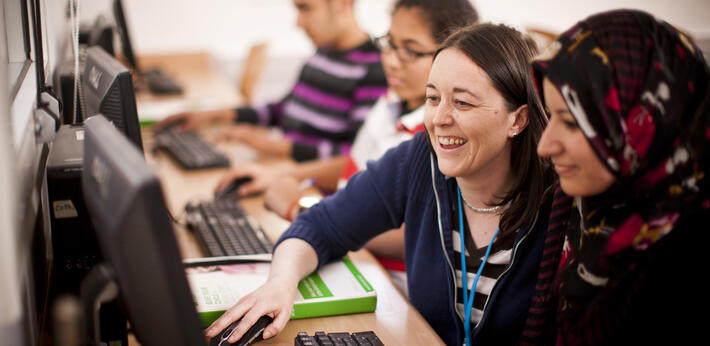You are here
Home ›06/04/2021
Wider Europe - Covid-19 update - 06 April 2021
In order to keep the UK education sector updated on the market changes, priorities and give an overview of the situation with Covid-19 in Wider Europe, the International Education Services team in the region is pleased to present you with the following news.
In this update we will give you an overview of the situation with Covid-19 in the Wider Europe countries, the pandemic effect on the education system, economy and other key areas of countries' development.
Here is the quick summary in the region:
Kazakhstan – rapid growth of infection rate, pupils back to home-learning, quality assurance at HEIs rolls out, education priorities of Kazakhstan
Turkey - tightened Covid-19 measures, cases increasing
Kazakhstan
Update 06 April
Kazakhstan declared a state of emergency to curb the spread of the Covid-19 infection on 16 March through 11 May after the World Health Organization defined the spread of the coronavirus as a pandemic.
Since then, Kazakhstan has seen a number of restrictive measures being taken in order to hold the spread of virus, yet it had to allow businesses to reopen by following some sanitary requirements which include social distancing, wearing masks, limited number of people in one room, etc.
Quick summary in the beginning of April:
- Kazakhstan still divides the country into Red, Yellow and Green zones. Currently, the red zone cities and regions are Almaty, major financial centre of the country, Nur-Sultan, country capital, and the West-Kazakhstan region, Kazakhstan’s oil capital. Generally, the country has seen the number of Covid-19 cases raise over the past month and the daily rate of infection is over 1,000 people (40% higher than in March)
- The total number of people that have been infected with Covid-19 in Kazakhstan stays at over 300,000 thousand people (more than 275,000 people recovered). The active cases in the country at the moment tops 25,000 people.
- Public places are being allowed to operate on weekdays with sanitary measures being in place. The country closes all businesses i.e. cafes, shopping centres, theatres, etc. that can cause mass gatherings over the weekends.
- The government declared an initiative to run a mass vaccination campaign throughout the country in the medical facilities and there are plans to open up vaccination points at shopping centres. However, the campaign was intermittently slowed down in the biggest city Almaty on 5 April for a while and the restart date of the campaign is to be announced in a short while.
- As of 6 April, the number vaccinated people with the Sputnik V vaccine comes to around 110,000 people (the total population 18.2 million).
The harshened sanitary measures are expected to slow-down the infection rate and avoid the overload of treatment facilities as in June-July 2020.
School and universities
Students are returning to home-learning yet again. The previous relaxation of pandemic restrictions has now been called off and educational establishments (except for universities) are no longer allowed to do face-to-face teaching activities.
Universities are given permission to deliver classes in the traditional classroom format if they follow the sanitary requirements set by the local head of sanitary body. HEI students can take face-to-face classes if it is absolutely essential for them to do a lab or course work.
The Ministry of Education and Science is continuing its project of cancelling licenses at low-quality institutions, and in the beginning of March jointly with the Ministry of National Economy, the body issued an updated version of the checklist of inspections at HEIs. The new checklist consists of 46 criteria (previously 105) that institutions are going to be scrutinised under.
The labour market has also contributed to this project by making suggestions of heightening quality standards of delivery of Law, Medicine and Architecture & Construction programmes. The Ministry of Education and Science is going to take the lead and set requirements for professional experience of teachers/their qualifications and availability of specialised textbooks and computing software at HEIs.
Exams and assessments amid Covid-19
Unified National Testing (UNT), Kazakhstan’s state matriculation test, will be computer-based in 51 locations, the number of test takers is expected to be over 120,000 school leavers. The UNT has historically been held within seven days sometime in the June-July window but this year, given the pandemic restrictions, the test takers will be tested over a month-period of time.
Student financial support
The Bolashaq International Scholarship scheme list of approved institutions is now being revised, the new list is due to be out in the end of April. Once the new list is approved by the Ministry of Education and Science of Kazakhstan, we will organise an exclusive refresh meeting for UK institutions.
The new scholarship scheme for research students is going to be launched this year and the administrator of the governmental scholarship scheme is going to be JSC “Centre for International Programmes”, who is the current administrator of Bolashaq International Scholarship. It is expected that the new scheme will allow over 500 scholars to undergo internship programmes at overseas educational institutions and businesses.
Tune in to get more updates on the new scholarship scheme. The British Council together with the administering body Centre for International Programmes will be doing an online meeting for UK HEIs to explain how the scholarship scheme will work and what UK HEIs need to look out for benefitting from the sponsor scholars.
Economic situation
By the end of 2020 fiscal year, Kazakhstan’s economy shrank by 3.8%, says Eurasian Development Bank.
The World Bank predicts that the economy of Kazakhstan will grow by 2.5% in 2021, whilst the Eurasian Development Bank analysts predict an increase in aggregate GDP by 3.2% in 2021.
The Minister of the National Economy Ruslan Dalenov presented draft amendments to the law on the restoration of economic growth at the plenary session of the Senate. The amendments focus on the attraction of investment, development of entrepreneurship and the real sector, stabilisation of the financial market, digitalisation, project management, as well as improvement of monetary, social and trade policies.
Interesting to read:
Kazakhstan Continues Its Educational Reforms As Top National Priority by Astana Times.
According to the Bureau of National Statistics, over 29.1 thousand Kazakhstanis emigrated from Kazakhstan in 2020 and around 11.4 thousand people came to live in the country.
This shows that the difference between the immigrants and emigrants was 17.6 thousand people. For the first time in recent years, the number of emigrants decreased by 35.6%.
Contact
For more information and insights about the Covid-19 situation in Kazakhstan, please contact Zhanaidar Duzgenbay, International Education Services Coordinator, Kazakhstan at Zhanaidar.Duzgenbay@britishcouncil.org.
Turkey
Update 06 April
The number of Covid-19 cases have climbed up to 40K as of April 2021. Due to the increase in the number of very high-risk provinces across Turkey, weekend curfews are again in place on Saturdays. Turkey’s coronavirus risk map colours 58 provinces ‘red’, which covers 80 per cent of the population. Restaurants and cafes will operate at half capacity across all provinces between 07.00-19.00. During Ramadan, weekend lockdowns will be in effect in Turkey and restaurants and cafes will be closed but allow home delivery. Curfews will be in place every day of the week from 9:00pm to 5:00am.
Temperature checks and physical distancing rules are still in place and wearing a mask is compulsory in public areas.
Most international flights are ongoing with most European Union destinations still closed to Turkish citizens.
All passengers are required to undergo a PCR test coronavirus.
Mass vaccination with Chinese Sinovak is in progress, to date, over 10 per cent of the total population has been vaccinated. Biontech is also an option for people who have a chronic disease.
Economic outlook in Turkey
The Turkish Lira continues losing value against foreign currencies. TRY devaluated ten per cent against Sterling in April 2021.
Turkey’s foreign trade deficit increased by 8.7 per cent compared to the same month of the previous year and rose from USD 3 billion 36 million to USD 3 billion 299 million.
School and university closures
Over 26 million students are affected by Covid-19, including 18 million school students and 8 million higher education students.
Schools
All pre-school students are fully back to face-to-face teaching.
Students at their final grades in middle and high schools are back to schools up to two days depending on the risk that the cities are categorised.
Face-to-face exams for high school students have been re-scheduled for May.
Universities
The delivery mode of teaching at universities is hybrid, a combination of online and face-to-face teaching/activities for small groups those are required for applied science courses.
International Student Mobility
Number of students enrolled to a UK higher education programme increased (from 4,130 to 4,440) by 8 per cent in 2019/20 compared to previous year. Undergraduate market grew by 14 per cent. This ought to be the growth in undergraduate in previous years.
We organised the Study UK School Counsellors Workshop to bring together counsellors and UK institutions virtually in March. 11 participating UK universities delivered presentations about their university and programme offers. There were 40 counsellors attending the sessions according to their interests. Due to high demand, we will organise another workshop in May.
UK Visas and Immigration (UKVI)
UKVI have agreed with the Visa Application Centres (VACs) managed by TLS Contact to reduce the opening hours of their visa application centres with effect from the 1 March. The VACs in Istanbul, Ankara and Izmir will return to opening three days a week on Mondays, Tuesdays and Fridays.
Contact
British Council direct marketing services, including digital promotion, remain available to help the UK institutions engage with students and retain a presence in Turkey.
For more information, please contact Semra Yalcin Dogan, Education Manager at Semra.Yalcin@britishcouncil.org.tr.
The previous update can be found here (includes Russia).






